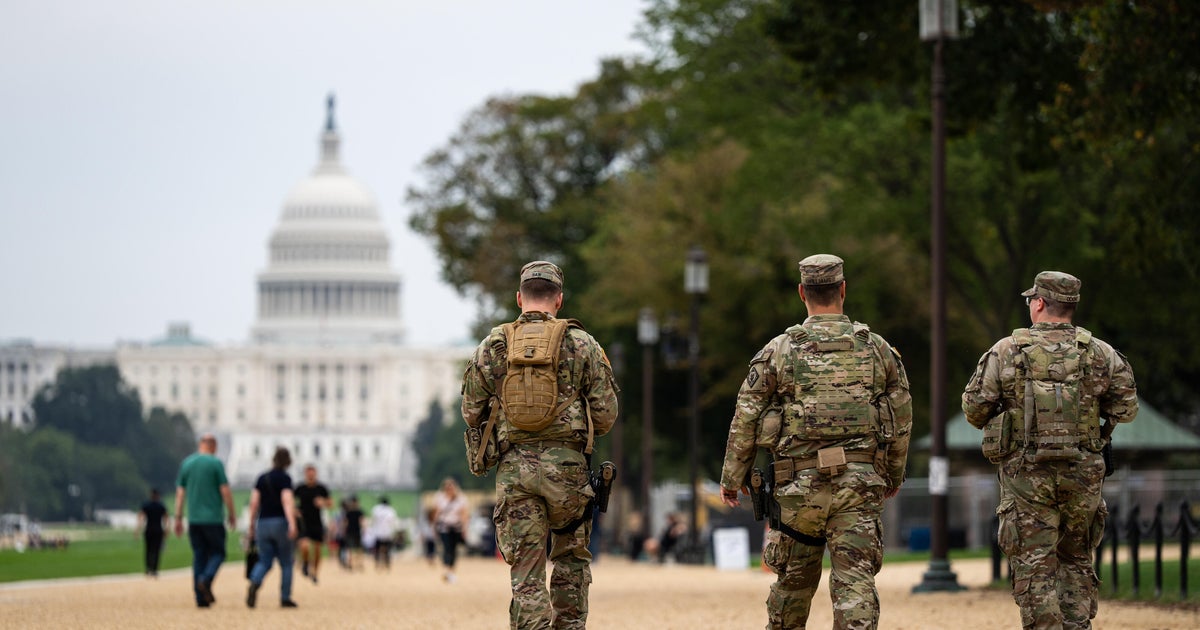
A federal judge ruled Thursday that President Trump’s months-long deployment of thousands of National Guard forces to the streets of Washington, D.C., violates federal law.
U.S. District Judge Jia Cobb sided with D.C. Attorney General Brian Schwalb, who sued the federal government over the Guard deployment, arguing it exceeded the president’s legal authority. But the judge stayed her ruling for 21 days to give the Trump administration a chance to appeal it.
White House spokeswoman Abigail Jackson blasted the ruling, arguing that Mr. Trump has the authority to deploy Guard troops in the nation’s capital. Jackson called Schwalb’s lawsuit “nothing more than another attempt — at the detriment of DC residents — to undermine the President’s highly successful operations to stop violent crime in DC.”
In his own statement following the ruling, Schwalb said, “Normalizing the use of military troops for domestic law enforcement sets a dangerous precedent, where the President can disregard states’ independence and deploy troops wherever and whenever he wants – with no check on his military power. This unprecedented federal overreach is not normal, or legal. It is long past time to let the National Guard go home – to their everyday lives, their regular jobs, their families, and their children.”
Mr. Trump first ordered National Guard forces to D.C. in August, part of a broader crackdown on crime using a combination of Guard troops, federal law enforcement agents and local D.C. police who were briefly taken over by the federal government.
Since then, Guard forces have been a common sight on the streets of the capital, especially in tourist-heavy areas, drawing pushback from some local officials. The deployment has been extended multiple times, and is currently set to run until at least February 2026.
The president deployed the D.C. National Guard using his authority as commander in chief of the district’s Guard forces — a unique arrangement as state-level Guard forces are usually controlled by governors. Several GOP-led states have also sent their own Guard troops to the city.
In Thursday’s ruling, Cobb said the president lacked the power to deploy the D.C. Guard for “non-military, crime-deterrence missions in the absence of a request from the city’s civil authorities.” She said that, even though the president is the force’s commander in chief, he doesn’t have unlimited power to deploy the Guard as he sees fit.
The federal government has argued the deployment is justified by a clause in D.C. local law that says the Guard’s commanding general “may order out any portion of the National Guard for such drills, inspections, parades, escort, or other duties” — with the current deployment falling under the category of “other duties.” Cobb disputed that interpretation, writing that “other duties” appears to only cover military exercises.
The Trump administration has also pointed to a local law that says the Guard can “aid the civil authorities in the execution of the laws.” But Cobb said that doesn’t allow the government to “unilaterally call upon the DCNG to assist the District with crime control,” without a request from local officials.
Separately, Cobb said federal law “cannot support the out-of-state National Guards’ operations in the District because there is no state-law basis for those Guards to travel to the District.”
Mr. Trump has dispatched National Guard forces to several other cities in recent months, often to protect federal agents and property during immigration crackdowns — drawing local pushback and mixed results in court.
Members of the California National Guard were deployed to Los Angeles over the summer, despite opposition from Gov. Gavin Newsom. And hundreds of out-of-state National Guard forces were later sent to Chicago and Portland, Oregon, though many of those troops are set to return home, a Defense Department official confirmed to CBS News last weekend.
The Trump administration has argued the deployments were justified because of tense protests against immigration agents, pointing to Title 10, a law that allows the Guard to be used when “there is a rebellion or danger of a rebellion against the authority of the government of the United States.” Local officials have said the deployments are unnecessary and inappropriate, arguing that local police can handle the protests themselves.
A panel of appeals court judges allowed Mr. Trump’s Los Angeles deployment to go forward over the summer, following a lawsuit from Newsom, but a judge later found the troops had illegally engaged in civilian law enforcement. In Chicago and Portland, judges blocked Guard forces from being deployed onto the streets, leaving them in a holding pattern for weeks.
